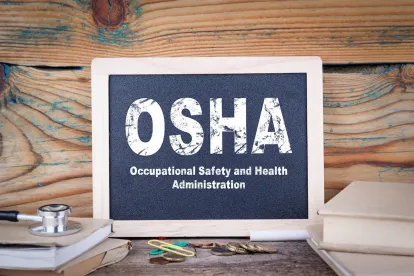Thank you to my colleague, Jonathan Schaefer, for his contributions to this post. Jon focuses his practice on environmental compliance counseling, occupational health and safety, permitting, site remediation, and litigation related to federal and state regulatory programs.
Since at least March, manufacturers, and the entire U.S. economy, have been experiencing unprecedented conditions as a result of the COVID-19 pandemic. COVID-19 has not only changed where and how manufacturers operate, but also safety protocols across the board.
It will likely come as no surprise to any manufacturer, that since February there has been a significant increase in the Occupational Safety and Health Administration’s (OSHA) caseload. The U.S. Department of Labor’s Office of Inspector General (OIG) recently found that this increased caseload has resulted in the average number of days to close an investigation to increase 41 days (279 versus 238) since the OIG’s last audit.
The OIG also found a significant increase in the number of whistleblower complaints since COVID-19 began impacting workplaces in early March. From February 1 to May 31, OSHA received 4,101 whistleblower complaints. This represents a 30 percent increase over the same time period last year. Of the 4,101 whistleblower complaints, the OIG identified at least 1,618 as COVID-19 specific – representing approximately 39 percent of all whistleblower complaints.
The OIG’s recent COVID-19 Audit Report also included recommendations as to how OSHA can expedite its investigation procedures and reduce delays caused by the increased caseload. OSHA’s response to the Audit Report (included with the Audit Report) announced that two of the five whistleblower investigator vacancies identified in the Audit Report have already been filled and OSHA is actively working to fill the remaining three vacancies. In addition, OSHA is currently evaluating an ongoing pilot program aimed to increase efficiency in the processing of whistleblower complaints.
In addition to being aware of the overall increase in OSHA whistleblower complaints and caseload, manufacturers would be well-served to refresh their health and safety plans and anti-retaliation policies. While regular review of health and safety policies and regular health and safety trainings have become commonplace throughout the manufacturing industry, it may also be advisable to regularly review anti-retaliation policies and associated trainings.
Also, ensuring that employees have available avenues to share their health and safety concerns internally, even anonymously, can help address employees’ concerns early. Finally, if any adverse employment actions are anticipated against an employee who may have exercised their rights under OSHA, then involving an appropriate team of human resources and legal professionals could help mitigate the risks associated with a whistleblower complaint.



 />i
/>i

